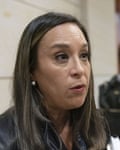Roughly 80 new members will join the House of Representatives when the 118th Congress convenes in January.
Along with their more seasoned colleagues, they will have to navigate the potentially tricky terrain of a narrow Republican majority in the House as Democrats control the White House and the Senate.
The new members come from every part of the county, and they vary dramatically in terms of political ideology. Some are progressives who have demanded universal healthcare coverage, while others have embraced Donald Trump and his lies about widespread fraud in the 2020 presidential election.
As the final ballots are counted and Americans prepare for another significant shift in the political landscape, here are five new members of the House to keep an eye on:

Maxwell Frost, a Democrat of Florida
Maxwell Frost will become the first Gen Z member of Congress when he takes the oath of office in January. Just 25 years old, Frost won his Orlando-area seat by campaigning on implementing Medicare for all and reforming America’s gun laws.
Frost, a March for Our Lives organizer who first became involved in politics after the shooting at Sandy Hook elementary school in 2012, has made it clear that he will be aggressive in addressing gun violence. After the recent shooting at an LGBTQ night club in Colorado Springs, Frost has repeated his call for Congress to advance an assault weapons ban.
The House passed an assault weapons ban in July, but the bill stalled in the Senate. With Republicans now in control of the House, it will be nearly impossible to resuscitate the proposal, but Frost is undeterred.
“I think it’s important to put it up for a vote even if it doesn’t pass because it gets people on the record,” Frost told NBC News on Monday. “We have to show the American people that this is a problem that our government is working on and we’re going to solve.”
Frost’s determination to take action on his top policy priorities could ruffle some feathers within the House, but his persistence could also help keep Democrats motivated in the face of Republican obstruction.

Becca Balint, a Democrat of Vermont
One of Frost’s new colleagues in the Congressional Progressive Caucus will be Becca Balint, a Democrat of Vermont. Balint’s victory earlier this month made history; she will be the first woman and the first openly LGBTQ person to represent Vermont in Congress. Once Balint is sworn in, all 50 US states will have sent a woman to Congress, as Vermont was previously the sole outlier on that metric.
Balint has described herself as “a scrappy little queer lady” who was initially written off in Vermont’s crowded Democratic congressional primary because of her lack of widespread name recognition or political connections.
“What I did have was an amazing team that believed that I could do this if I got in front of enough Vermonters and spread a message of courage and strength and hope,” Balint said at a press conference earlier this month.
“We did it because we tapped into the courage of working people across Vermont, regular people who want to have a voice again. That’s who I am. That’s who I will be in Congress.”
Frost and Balint are just two members of an expanded progressive caucus that may be able to exert more influence over Democratic leaders starting in January.

Monica De La Cruz, a Republican of Texas
De La Cruz’s win was a bright spot for Republicans on a generally disappointing election night. De La Cruz will be the first Republican to represent the 15th congressional district in southern Texas, where the party has been trying to make gains among Latino voters.
Party leaders had hoped to win two other south Texas districts with Latina Republicans, reflecting their broader strategy this year of attempting to flip seats by running a more diverse slate of candidates. Mayra Flores ran in the 34th district, while Cassy Garcia competed in the 28th district. Together with De La Cruz, the three women were often dubbed the “Triple Threat” in conservative media, but of that group, only De La Cruz won her race.
Overall, De La Cruz will be one of at least 45 Latino lawmakers serving in the 118th Congress, marking a new record for the US. Several newly elected members – including Democrat Yadira Caraveo in Colorado and Democrat Delia Ramirez in Illinois – will be the first Latinas to represent their states in Congress.
Despite Republicans’ efforts to diversify their House caucus, they still trail Democrats on that front. At least 34 Latino Democrats will serve in the House starting in January, compared with at least 11 Latino Republicans. With the victories of John James in Michigan and Wesley Hunt in Texas, the number of Black Republicans in the House will also double in January – from two to four. In comparison, 58 Black Democrats are currently serving in the House.

Mike Lawler, a Republican of New York
Mike Lawler’s victory made national headlines, as he defeated the incumbent congressman Sean Patrick Maloney, who served as the chair of House Democrats’ campaign arm this election cycle.
Lawler was one of four Republicans who flipped House seats in New York, and those wins ultimately proved crucial in determining control of the lower chamber. When the “red wave” that many Republicans had expected failed to materialize on election day, the success of Lawler’s group helped them win back a narrow majority.
Because of that slim majority, the incoming Republican speaker will be able to afford only a few defections within the party when trying to pass legislation. There are already signs of tension and disagreement within the House Republican caucus, and Lawler is one example of this. While most House Republicans continue to wholeheartedly embrace Trump and his divisive brand, Lawler has suggested that it may be time to move on from the former president, particularly after his endorsed candidates fared so poorly on election day.
“I would like to see the party move forward,” Lawler told CNN earlier this month. “I think more focus needs to be on the issues and the substance of those issues than on personalities.”
But many of Lawler’s new colleagues may not be ready to start a new chapter for the Republican party.

Max Miller, a Republican of Ohio
Max Miller, who won the race to represent a newly reconfigured House district in Ohio, personifies Trump’s enduring hold on the Republican party and the House Republican caucus in particular.
Most of Miller’s district is currently represented by Anthony Gonzalez, a lawmaker who was once considered a rising star in the Republican party but became a target of scorn after he voted to impeach Trump for inciting the January 6 attack on the Capitol. Following that vote, Miller received Trump’s endorsement to launch a primary challenge against Gonzalez, and the incumbent congressman later announced he would not seek re-election.
Miller has his own connection to the January 6 insurrection, as he appeared before the House select committee investigating the Capitol attack over the summer. According to the committee, Miller participated in a meeting two days before the attack to discuss the rally that Trump held on the Ellipse immediately before a group of his supporters stormed the Capitol.
Miller won his seat in Congress partly thanks to Trump’s endorsement, and he will probably be quite hesitant to distance himself from the former president. That hesitation could put him and his allies on a collision course with colleagues like Lawler, who say they want to chart a new course for the Republican party.
The incoming Republican speaker will need to keep all factions of the caucus unified to get anything done. That task already appears immense.
